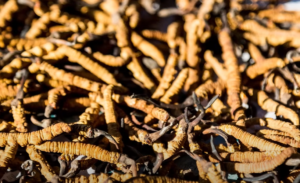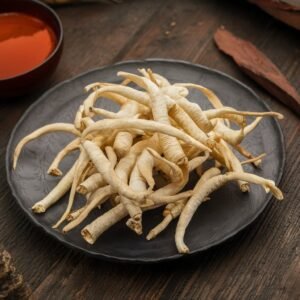Cordyceps in Malaysia: An Overview
 The parasitic fungus cordyceps provides several health advantages, such as increasing immunity, improving athletic performance, and supplying energy. In Malaysia, Cordyceps has gained popularity as a supplement and ingredient in various health products. This overview will explore the benefits, cultivation, market trends, and considerations for Cordyceps in Malaysia.
The parasitic fungus cordyceps provides several health advantages, such as increasing immunity, improving athletic performance, and supplying energy. In Malaysia, Cordyceps has gained popularity as a supplement and ingredient in various health products. This overview will explore the benefits, cultivation, market trends, and considerations for Cordyceps in Malaysia.
Benefits attributed to the Cordyceps fungus
Although numerous studies have been carried out to analyze the properties of Cordyceps, most have been carried out on animals or in laboratory tests, so it is advisable to be cautious as there is still much more research to understand this fungus’s benefits fully. However, these are the ten primary health benefits attributed to it:
- Increased performance and energy: A study published in the International Journal of Medicinal Mushrooms. This fact began to be investigated after Chinese athletes broke three world records in running in 1993 and reported eating a diet rich in Cordyceps Sinensis.
- Anti-aging: Besides its anti-fatigue effect, this mushroom makes older people feel more active, according to a 2016 study done with human peripheral blood cells. In addition, in tests done on mice, it was observed that those who had taken this mushroom lived several months longer than those in the control group who ingested a placebo.
- Sexual enhancer: This is one of the primary uses of Cordyceps, and it seems that it can be effective for both men and women. A study published in the Indian Journal of History of Science analyzed it and concluded that it can combat sexual dysfunctions and be a natural alternative to Viagra.
- It stimulates the immune system and is anti-inflammatory: Although some inflammation benefits the body, too much can promote the development of heart problems or cancer. According to a Korean study, cordyceps reduces proteins that increase inflammation, so it is a natural complement to anti-inflammatory drugs. It could even be an alternative to treat inflammation of the airways, as occurs in the case of asthma, or at least that is what a study carried out on rats shows.
 Protects the heart: According to a study published in Phytotherapy Research, Cordyceps increases adenosine levels. In addition, Chinese research tested the effect of this Tibetan mushroom on mice with a diet rich in saturated fats. The results showed that supplementation increased adenosine levels in the blood, promoting improved cardiovascular health.
Protects the heart: According to a study published in Phytotherapy Research, Cordyceps increases adenosine levels. In addition, Chinese research tested the effect of this Tibetan mushroom on mice with a diet rich in saturated fats. The results showed that supplementation increased adenosine levels in the blood, promoting improved cardiovascular health.- It helps control blood sugar levels. Another study published in the Journal of Diabetes Research corroborates these findings and confirms improvements in triglycerides and bad cholesterol.
- Possible anti-cancer effect: This is, along with the sexual effect, one of the reasons why people consume more Cordyceps, specifically the military Some studies claim that it is based on specific research, as shown by research published in the Journal of Microbiology and the DARU Journal of Pharmaceutical Sciences and Molecules. However, it must be clear that most have been carried out only in laboratory tests.
- It helps fight depression: a study carried out by the Noevir-Keio Research Laboratory found that Cordyceps sinensis had an antidepressant effect on mice with depression, as it was able to increase the levels of adrenaline and dopamine, two hormones that cause pleasurable sensations. However, it did not affect the serotonin levels, another of these hormones. An effect that has not yet been proven in humans.
- Improves fertility: This effect affects both men and women. In the case of women, the Tibetan mushroom stimulates endocrine functions. It regulates hormones, which, according to the International Mycotheraphy Institute, could help ensure that the egg matures during fertilization and prevent excess mucus that can clog the fallopian tubes. In the case of men, a study on pigs published in The American Journal of Chinese Medicine found that males who took Cordyceps militaris experienced a 33% increase in sperm count, 29% fewer malformations, and a 79% greater survival rate.
- Beneficial for the liver: a study by the World bhicould slow tissue fibrosis, reduce inflammation, and improve hepatocellular function, thus delaying the development of cirrhosis

